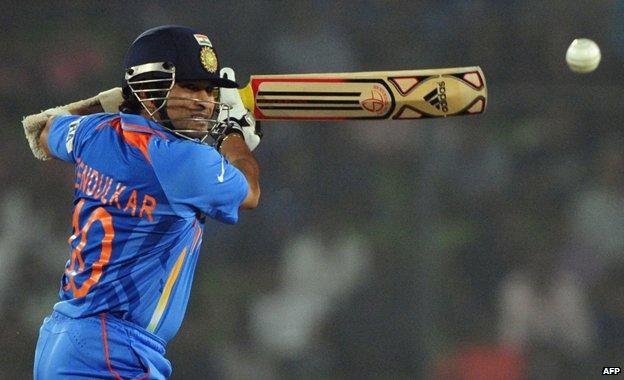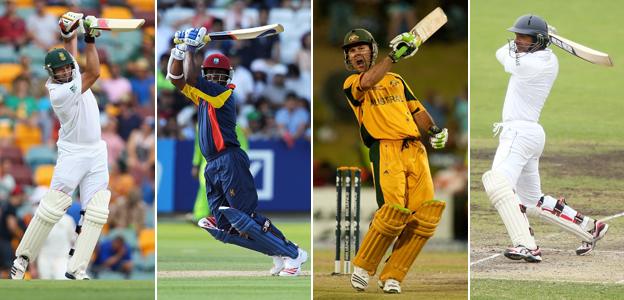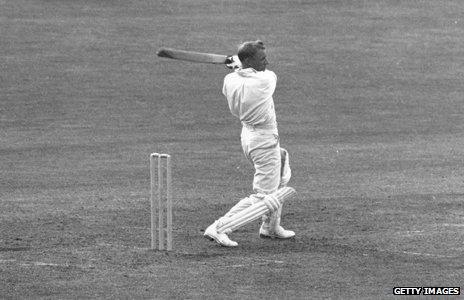Sachin Tendulkar: The world's 29th best batsman?
- Published

In his home city of Mumbai, Sachin Tendulkar is bringing to an end a career that has earned him god-like status in India. But how good are his batting stats compared with other top players?
If we looked purely at cumulative runs scored then this article would be very short.
Sachin Ramesh Tendulkar had amassed 15,921 Test runs after the first innings of his final Test on Thursday, which is about 2,500 more runs than any other cricketer.
Let's compare him to four other players - whose names would surely be mentioned in any discussion about the greatest batsman of the last 20 years - Australia's Ricky Ponting, South Africa's Jacques Kallis, Brian Lara of the West Indies and Kumar Sangakkara of Sri Lanka.

Left to right: Jacques Kallis, Brian Lara, Ricky Ponting, Kumar Sangakkara
Tendulkar's 15,921 Test runs compare with 13,378 for Ponting during his Test career, while Lara made just short of 12,000. Kallis and Sangakkara, who are still playing, have 13,140 and 10,486 respectively.
But while Tendulkar dominates in terms of overall runs he's also way ahead in terms of number of games played.
His final Test is his 200th. That's 32 more than Ponting played and 68 more than Lara. Kallis is 36 games behind and Sangakkara a full 83.
So perhaps a fairer way of comparing cricketers is by looking at averages?
This brings cricketers who played decades ago into the picture. In previous generations, cricketers played far fewer matches, so no-one whose career ended before 1950 features among the top 35 all-time aggregate Test run scorers.
But when you look at averages, the man who reigns supreme is Australian Donald Bradman, who played for 20 years between 1928 and 1948.
Incredibly, Bradman ended his career with his average at 99.94.
No other batsman gets close.
Looking at those who have played a minimum of 20 Test matches, Tendulkar ranks 17th on the all-time list with an average of 53.78.
That is marginally ahead of Ponting and Lara (who rank 24th and 18th) but marginally behind Kallis at 14th, with an average of 55.44 and Sangakkara at 10th on 56.98.
But the astonishing thing about Tendulkar is his level of consistency - he has averaged more than 50 for the last 18 years.
Like many great batsmen, his average has fallen in the twilight of his career, however. So might an even better way of measuring a player's greatness be to examine how he performed at the peak of his powers?
The International Cricket Council (ICC) player ratings allow you to do this by valuing each player's performance based on various circumstances in a match, such as the level of run-scoring and the standard of the opposition. The ICC gave Tendulkar his highest rating in 2002, when he was awarded a "score" of 898 after a Test against Zimbabwe.
But that is only the 29th highest of all time.
Bradman, again, leads the way with 961 awarded to him after a Test against India in the dying days of his career, in 1948. And Ponting, Sangakkara, Kallis and Lara all achieved ratings above 900 - a level which the ICC says is "an indication of quite exceptional, world-class form".

Australian cricketer Donald Bradman in 1930
The ratings imply that at his peak Tendulkar was not as impressive as the others.
But he did top the ICC batting rating table on five occasions during his career, and a 16-year gap between his first (1994) and last (2010) appearance at the top of the rankings again shows how consistently he performed at a high level over a prolonged period.
But there are other yardsticks too, by which to measure a batsman's career.
Many cricket purists prefer to disregard stats, and focus on the skill, style and strength of will a player displayed during a great innings.
Patrick Ferriday and Dave Wilson, authors of Masterly Batting: 100 Great Test Centuries, created their list of favourites based on a number of different criteria - runs, conditions, bowling strength, percentage of team total, chances, speed, series impact, match impact, and what they refer to as "intangibles".
Tendulkar makes their list just once, in 100th place, for the 155 not out he scored against Australia in Chennai in 1998.
This seems a meagre return for a man who has hit 51 centuries in his Test career. Brian Lara, meanwhile, has five centuries in Ferriday and Wilson's top 100, including three in their top 20.
"Tendulkar's reputation is based on his longevity, consistency and the fact he has played his whole career under the pressure of being an Indian icon," says Ferriday.
"But I don't think he played the stellar innings that Brian Lara played. Most of Lara's centuries were innings that either saved his team from losing or enabled them to win. Tendulkar's were often hidden amongst those of his team-mates."
Yet another method of measuring a player's value was introduced in 2010. The Impact Index measures every player relative to the other performances in the same match.
Its creator, Jaideep Varma, pays tribute to the one man he feels has made a pre-eminent contribution to the Indian side over the last 20 years, but it's not Tendulkar… it's Rahul Dravid.
"Dravid has more series-defining performances (eight) than Tendulkar does (six) in fewer matches," says Varma.
"The great players tend to take the lead, they tend to dominate, which Tendulkar has not done in the big matches right throughout his career. Rahul Dravid is a superior Test player to him in terms of changing the cricketing history of his country."
But there is one big intangible that has made Tendulkar's career different from almost any other player's - the weight of expectation.
Tendulkar has batted for 24 years under the gaze of a billion devoted Indians. It could be argued that the fact he's survived and revelled under these conditions is a better indication of greatness than any number could ever be.
"Outside grounds, people wait until he goes in before paying to enter," Shane Warne once said. "They seem to want a wicket to fall even though it is their own side that will suffer. This is cricket as Sachin has known it since the age of 16. He grew up under an incredible weight of expectation and never buckled once."
As he walked out to bat at his home ground in Mumbai on Thursday, the Little Master was hailed by hundreds of portraits held aloft and banners protesting love.
But perhaps none of them summed up India's attitude better than the sign seen at the 2011 cricket World Cup, when Tendulkar scored 120 against England at Bengaluru.
"Commit your crimes when Sachin is batting. They will go unnoticed, because even the Lord is watching."
Follow @BBCNewsMagazine, external on Twitter and on Facebook, external
Thanks for your comments.
People make careers out of measuring or monetizing intangibles. Anyone trained in statistics will tell you that such projects are fraught with inaccuracies. Runs - world record, centuries - world record, tests played - world record, 15K runs + 40 wkts - the only one in the world. Personality - epic. Ambassadorship - (ahem Ponting-is-not-on-this-list ahem) stellar. Enough said. Surge, Delhi, India
For the viewing public without whom there would be no cricket, the game is increasingly about entertainment as shown by the popularity of 20/20. However, pre-dating the advent of that version of the game, three names stand out, all knighted, namely V Richards, I T Botham and G Sobers. Chris Lampard, Oxfordshire, UK
In my system of judging batting merits, which includes points for runs scored, centuries and fifties, batting average, 4s, 6s and run rate, Tendulkar comes in at 8th for all batsmen with 20 tests or more and who played in the last 25 years. Brian Lara is 1st, followed by Sangakkara, then Hayden, Sehwag, Amla, Younis Khan, Tendulkar, Kallis and then Ponting at 10th. Martin Quartermaine, Pucon, Chile
This is a great article, which helps challenge the Sachin hysteria that is currently going on. I think most unbiased cricket fans would place Lara ahead of Tendulkar, if we consider both batsmen's generation. Lara at his peak is simply incredible, and he has several ODI matches against Australia which demonstrated batting of the quality I have never seen before. Another thing about Lara is that his big scores tend to come against big teams and big bowling attacks, whilst Tendy - a master in his own right - tends to score big against minnows (his high score is vs Bangladesh) or when the best bowlers in big teams have retired or are absent. Trent, Surrey, UK
In my opinion, averages does not make one a great cricketer. Apart from the longevity factor, it is his consistency over the years, sans last couple of years, that made Sachin stand out. There are players who have better averages than him, better strike rate, better impact as player. But he is a player in whom all these parameters converge in very high degree. Can anybody deny that he was destroyer of any attack with alarming consistency in the first half of his Test career? Apart from these things, he is a fine human being known for his humility, integrity, humbleness and childlike innocence. All these qualities make him one of the greatest sportsman who ever lived on this planet. Sharad Savadi, Navi Mumbai, India
Fantastic to see such a well balanced, honest and wholly realistic assessment of a "great" cricketer who is not, by a long way, the greatest in any respect. Let's not forget that more than half (if you include Pakistan and Sri Lanka) of his runs have been scored on batsman-friendly sub-continent pitches. Even in India, he has to rank below Sunil Gavaskar, an opening bat who single-handedly took on and beat the Windies pace battery time and time again (perhaps the best bowling attack in history), and on pitches in the Caribbean. Incidentally, he used to hold records for the most runs and most centuries in Test cricket before Tendulkar. Gavin, Wolverhampton, UK
Viv Richards was the finest I ever saw in the flesh. There are plenty of others that I've seen that would rank higher too - Ponting, Lara, Dravid, (Greg) Chappell to name but four, as well as those I never had the chance to see - Bradman, Hobbs, Hutton, Hammond among others. However, Tendulkar is truly a great for delivering such a weight of runs under the pressure of huge expectation, and inspiring such massive interest in the game in India. Vaughn Smith, Gloucester, UK